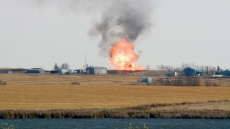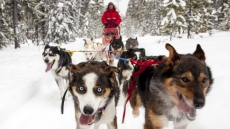EDMONTON - Environmentalists are basking in a warm glow of satisfaction this week as they celebrate the 20th anniversary of one of the largest and most successful conservation programs on the planet.
"We're trying to share some good news with people," said Harvey Locke, one of the founding members of the Yellowstone to Yukon project, which is slowly creating a vast, interconnected network of protected mountain landscapes down the western spine of North America.
"In the 1980s, we discovered that national parks as islands would not maintain their qualities through time," Locke said. "Even our biggest parks are vulnerable to losing their biggest animals over time unless they were part of a much larger system."
Slowly, through agreements with provincial and state governments, aboriginal groups and private landowners, that larger system began to emerge.
Including national parks and other conservation designations, there are now 676,000 square kilometres of protected land between the northern tip of the Mackenzie Mountains in the Yukon and Yellowstone's Rockies in Wyoming. That's 20 per cent of the total area —about twice what was protected when Locke and others began.
Along the way, scientists have found solutions to persistent problems such as habitat fragmentation.
Disturbances such as highways cut one half of a species population off from the other. In response, Parks Canada created walkways above and below a road surface that allow animals to cross safely.
Those solutions are now admired around the world. Locke is to head a session at the upcoming World Parks Conference in Sydney, Australia, to talk about some of them.
"That's how Yellowstone to Yukon is perceived in the world — as sort of an exemplar."
Scientists say preserving large landscapes is the only way to save large predators, considered "umbrella" species, such as wolves or grizzly bears. If grizzlies are found in an area, for example, so will 80 per cent of all other species that are supposed to be there, said Locke.
Saving rivers is the other key in keeping big-scale ecosystems healthy, he said. Along with fish, birds are particularly dependent on rivers, so more of Yellowstone to Yukon's efforts are turning toward protecting waterways.
"Intact river systems that still have the full process of flooding are actually the spinal cord of the landscape," Locke said.
"Between the bears, which give us the landscape, and the river corridors, which give us structures needed for aquatic species and birds, we feel we've got a pretty good handle on what it will take to keep this wonderful mountain system alive."
Yellowstone to Yukon still faces major challenges, some in Canada.
Protecting the Flathead Valley in southeastern British Columbia is crucial to bears trying to move back and forth across the border, said Locke. And B.C.'s plans for the Site C dam would flood a huge area of land along the Peace River "dead centre" in the whole corridor.
In Alberta, energy and forestry development continues to degrade habitat on the eastern slopes of the Rockies.
The Yukon government's decision to drastically scale back conservation plans for the Peel watershed — now being challenged in the courts — is a threat on the northern end.
In the south, Yellowstone National Park still risks being relegated to being a conservation "island."
But Yellowstone to Yukon has made great strides both in the landscape and in public consciousness, said Locke.
"I really sense a difference for how a broad cross-section of people in this landscape are perceiving where we live. It's really quite interesting how having a unifying idea helps people to think about where they fit into a bigger whole.
"In the past, people like me would tell the story, 'This is the best of the last — if we can't save it here we can't save it anywhere.'
"What we now believe is that Yellowstone to Yukon should become the first of the rest. We can establish a new norm for how humans ought to live in the world."




